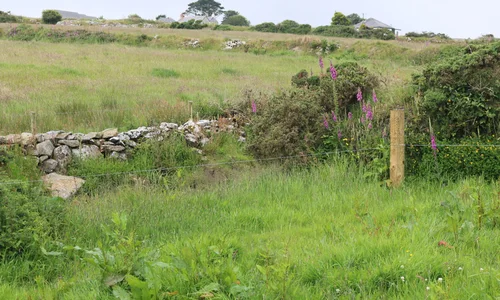 On Thursday 26th September Dr Hannah Jones representing both Duchy College and Reading University led an event at Sancreed Village Hall on management of Herbal Leys. The day was split into two parts firstly the morning session which took the format of an overview of the project work being carried out as part of the Agri-tech Cornwall ‘TOMS’ project, and the SARIC BBSRC funded Diverse Forages project. The presentation included information on the adaptability and changing nature of herbal leys, e.g. how soil type/ sward management can affect the type of species that become dominant in a particular situation. We also looked at the benefits and challenges of herbal leys for instance if white clover becomes dominant a farmer can use (i) intensive sheep grazing to suppress clover; or (ii) use tactical application of slurry or manure to encourage grass growth.
On Thursday 26th September Dr Hannah Jones representing both Duchy College and Reading University led an event at Sancreed Village Hall on management of Herbal Leys. The day was split into two parts firstly the morning session which took the format of an overview of the project work being carried out as part of the Agri-tech Cornwall ‘TOMS’ project, and the SARIC BBSRC funded Diverse Forages project. The presentation included information on the adaptability and changing nature of herbal leys, e.g. how soil type/ sward management can affect the type of species that become dominant in a particular situation. We also looked at the benefits and challenges of herbal leys for instance if white clover becomes dominant a farmer can use (i) intensive sheep grazing to suppress clover; or (ii) use tactical application of slurry or manure to encourage grass growth.
Later Hannah involved the group in an exercise to help the delegates find out which were the best species to include on their own field using a table showing the characteristics of a broad range of legumes, herbs and grasses. Hannah then gave feedback on the species mix designed by each farmer/landowner on the characteristics of each mix and any improvements that could be made. During these discussions we learned Alsike Clover (a white/red clover hybrid) was particularly tolerant of a range of pH’s, and plantain (also called ribgrass or hardhead) and chicory were both herbs that was particularly drought resistant. Throughout the morning session a steady flow of questions was forthcoming which demonstrated the level of interest that this subject creates.
Following a pasty lunch we moved on to a nearby Treganhoe Farm (by kind permission of the James Family) for a field walk over a series of four herbal leys established last autumn. It was amazing to see how the species present changed on a field to field basis according to field management and soil conditions. Hannah has agreed to return next year to update the local farming community on the progress of the trial being funded by the BBSRC through co-operation with Reading Universty, Duchy College, Rothamstead Research at North Wyke, and Cornwall Agri-tech, plus other partners.



